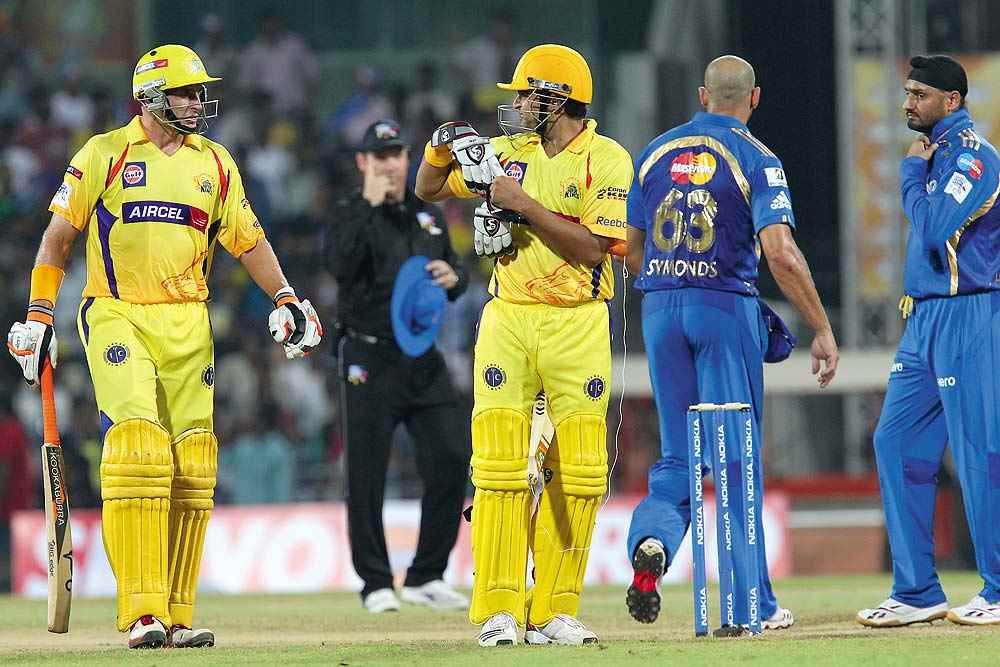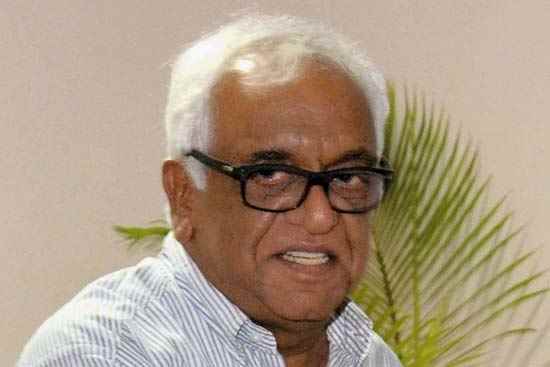An IPL Game Of Spot, Bet And Fix
How it all started
- The IPL betting and match-fixing scam became public when the Pune and Kochi teams were disqualified
- The Kochi team had already seen a controversy involving Shashi Tharoor and the now-deceased Sunanda Pushkar
- The Tharoor row led to the exit of IPL founder-commissioner Lalit Modi and his row with BCCI chief N. Srinivasan
- The conduct of at least 12 players, including two Australians, invited the scrutiny of Justice Mukul Mudgal
- Indians include five members of the 2011 World Cup-winning squad, two of whom are from the same IPL team
- The owners of at least three IPL teams are believed to be involved in the match-fixing racket
- Nearly 70 per cent of players are believed to be involved in betting on matches indirectly, if not directly
- Given the high purchase costs, team owners and associates have an added incentive to pre-decide match results
***
Indian cricket finds itself on a barely playable wicket. Justice Mukul Mudgal might indirectly have a say on India’s World Cup 2015 squad if the apex court makes public names of top Indian cricketers mentioned in his report on the alleged betting and spot/match-fixing in season 6 of the Indian Premier League (IPL). Top sources say that the 38-page report (with 5,000 pages of annexures) names around a dozen names of former and current players, Indian and international, with their roles in the multi-billion dollar scandal. Players, administrators, politicians, film stars and corporate czars are all protagonists in this sordid drama. It seems like the first draft of a crime thriller.Although codewords like ‘Individual 2’ and ‘Individual 3’ have been bandied about, the fact is the report names five Indian players who were part of the World Cup-winning team of 2011. Talented and temperamental, they run cricket academies, invest in the hospitality industry and event management, even advertising firms. Their partners in these ventures are the same set of people who form the link between them and the bookies; some are bookies themselves. Moreover, they are Page 3 regulars.
Take the case of a left-handed all-rounder. He broke down when questioned by Justice Mudgal. There wasn’t any dispute about his involvement, he was just begging that he be not named and pleaded for a life of dignity, says an insider, a cop involved in the investigation. Mercy, not justice, was also sought by a close friend of this cricketer, his teammate in the World Cup squad. A bowler known to pick fights on and off the cricket field, who spends more time in Mumbai, outside his home state.
The ‘Individual 3’ mentioned in Justice Mudgal’s report is a Chennai Super Kings player. A prolific run-getter and a god-fearing man, he visits the Sai Baba temple in Shirdi regularly with two bookies by his side, and has the protection and patronage of top cricket administrators. The fourth is a celebrity fast bowler with a career punctuated by injuries, who was often too unwell to play for the country, but was always fit for the IPL. He, too, has the backing of powerful team-owners. The most significant name is of a top idol, whose incredibly short saga of rags to riches is as exemplary as his passion for speed.
-----India 2011 World Cup team members:
Dhoni, Sehwag, Gambhir, Tendulkar, Yuvraj, Raina, Kohli, Zaheer, Sreesanth, Harbhajan, Y Pathan, Munaf, Nehra, Chawla and Ashwin
----
The flaw, as pointed out over the years by wise men, is in the IPL itself. It had so much to offer to players, administrators, umpires, even commentators, that the whole venture had an unviable air about it. It wasn’t charity either, where the glitterati altruistically invested to lose money. Instead, it turned out to be a money-spinner. With marquee players being bought for millions of dollars, glitz on the ground and expensive after-match parties, intelligent guesses always pointed to dirty money.
The first confirmation came when the Delhi police arrested three players—Sreesanth, Ajith Chandila and Ankeet Chavan—in 2013 for their role in spot-fixing and betting. Neeraj Kumar, the then Delhi police commissioner, refutes the charges that the cops let off the big fish. He confirms that many players were named by the bookies, but that he couldn’t have acted on mere accusations, without conclusive evidence. Rajasthan Royals owner Raj Kundra, he says, confessed to betting, but there was no corroborative evidence, and territorial jurisdiction was an issue. “The investigation was carried out objectively, was able to nail down large number of bookies and set off a chain reaction, with police in other metropolises also ending up investigating betting,” he says. One such investigator was G. Sampath Kumar of the Tamil Nadu police. He was suspended from his job last week on the charges of receiving Rs 55 lakh from a bookie, Uttam C. Jain alias Kitty.

Yellow fever A match involving Chennai Super Kings, now under a corruption-shaped cloud. (Photograph by AFP, From Outlook 01 December 2014)
A family member of one of the three players arrested by the Delhi police met Outlook in a coffee shop at Delhi’s Bengali market. The prosecuted three are just the tip of the iceberg, he says, and the submerged iceberg covers nearly the whole system. The IPL is but a gambling festival, he says, giving examples of how his relative was pulled into betting and match-fixing. “No player can escape the bookies. It’s not a choice,” he says.
---- Also Read
Sreesanth - Another modern day Valmiki?
----
While the Delhi police couldn’t gather enough incriminating evidence against the ‘big fish’, Justice Mudgal is forthright about some of them. N. Srinivasan—the man who controls both the BCCI and the IPL—can be accused of blatant conflict of interest, says a senior lawyer and cricket administrator. “He’s both the umpire and the player,” he says.
|
Apart from Meiyappan, the Mudgal report says IPL chief operating officer Sundar Raman had admitted doing nothing even after knowing that Raj Kundra was involved in betting. Furthermore, a third team (CSK and RR being the other two)—from the renowned stable of good times—is named in the clutch of outfits where the owners/their family members bet on their own team’s performance.

An eagle eye Justice Mukul Mudgal
Aditya Varma, secretary of the Bihar Cricket Association, treats the battle against corruption in cricket as a personal crusade, and has kept on the warpath in the face of both dire threats and propitiatory wads of cash. He presents a scenario: “If an owner bets, and lets his players, captain and the rest, know that he wants the team to get out on a specific score, say 120 runs, then it’s not betting, it’s match-fixing.”
Varma says there are two categories of culprits—administrators and players. Not bookies, he says, as that’s their job. There are two ways, he says, in which betting/match-fixing takes place: when the match is fixed with the help of owners or administrators, and when players themselves take the initiative for spot-fixing. Bookies are known to live in the same hotel as the players, and interact freely with them during parties. “I will seek an investigation in the conduct of all teams and owners. The story is much murkier than it looks,” says Varma.
As parts of the report have been made public, the government has responded with silence. The top politicians of the country have been, or are, cricket administrators—Arun Jaitley, Amit Shah, Sharad Pawar, Rajiv Shukla and Shashi Tharoor, to name a few. The politics of cricket has little to do with their party affiliations. The Narendra Modi government—seeking a global effort to retrieve billions of dollars of black money stashed in foreign banks—has chosen to ignore the cancer that is eating away Indian cricket. Union finance minister and former Delhi Cricket Association chief Arun Jaitley is mum too. Rajiv Shukla, former IPL chairman and a minister in the UPA cabinet, is anxious about the issue and is actively following the events, says a close friend. Some revered former players have also kept their counsel, perhaps because they are beneficiaries of the system. And Sachin Tendulkar’s autobiography, Playing It My Way, is silent about these murky depths in cricket, though some of his close friends are under the scanner.
In April this year, the SC had rejected the BCCI’s proposal to constitute a three-member committee to investigate the spot-fixing and betting charges, comprising ex-CBI director R.K. Raghavan, cricketer Ravi Shastri and former Calcutta High Court chief justice Jai Narain Patel. Raghavan is an affiliated member of the Tamil Nadu Cricket Association, headed by Srinivasan, Shastri is a salaried BCCI employee and Patel’s brother-in-law is Shivlal Yadav, the then interim board president for non-IPL affairs.
The audacious guile that led to the proposal of the panel resurfaced in the belligerence with which the BCCI has made light of the Mudgal committee’s report even before it’s considered by the Supreme Court—belittling it as ‘invalid’, asking the Supreme Court to form another panel and reinstate Srinivasan as BCCI chief (though forced to step down on November 3, he has been effectively in charge through proxy), while the probe is being conducted.
“The ball is now with the apex court, and chances of tampering is less,” says a former cricketer and BCCI office-bearer. With the ball swinging under favourable conditions, wickets might go down in a heap, taking with them reputations and hard-earned records.
No comments:
Post a Comment